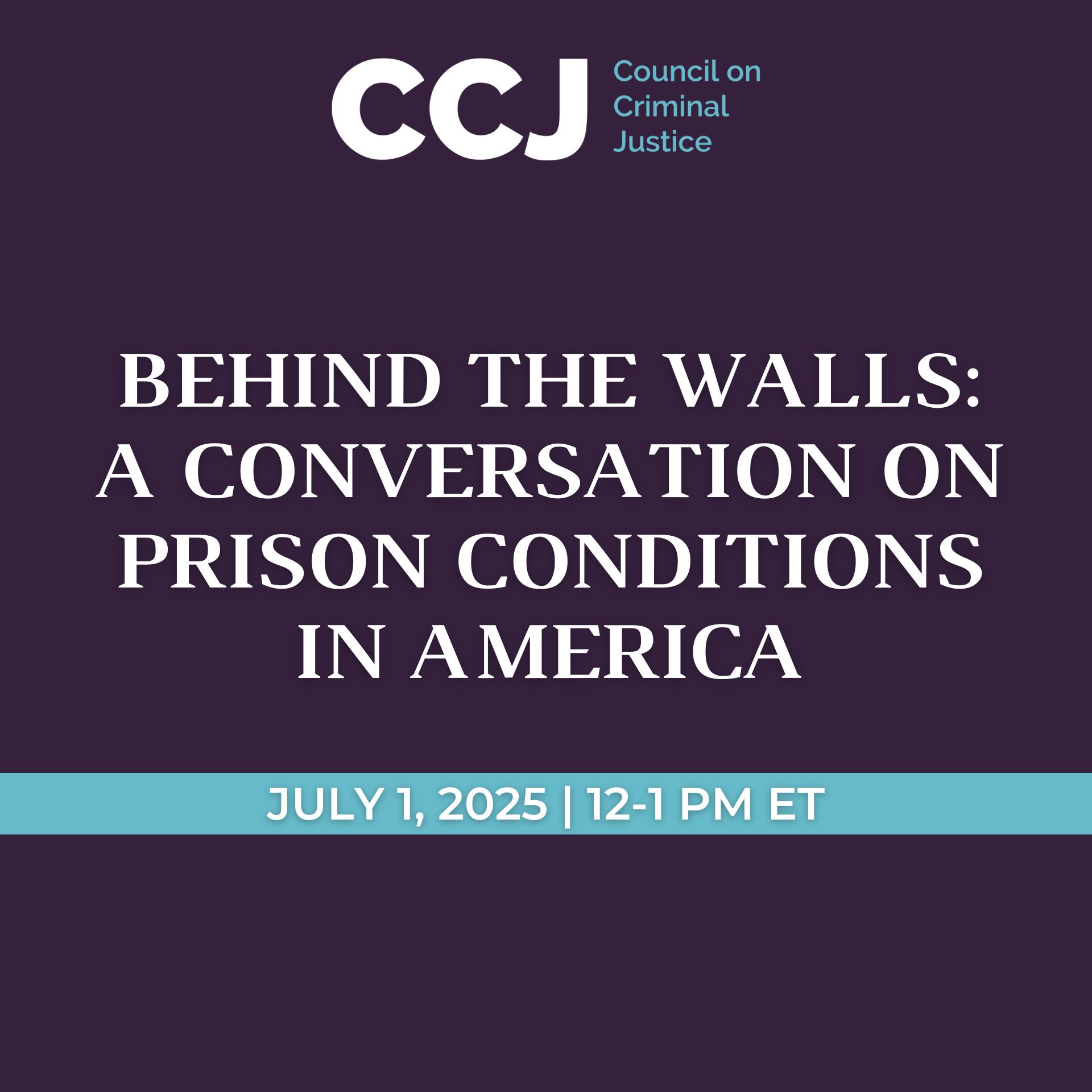Diverse expert panel will assess pandemic’s impacts and produce roadmap for immediate and long-term reforms
5:00 a.m. ET, July 28, 2020
Contact: Jenifer Warren
jwarren@counciloncj.org
916-217-0780
WASHINGTON, D.C. – The Council on Criminal Justice (CCJ) today launched a national commission to assess the impacts of COVID-19 on the criminal justice system, develop strategies to limit outbreaks, and produce a priority agenda of systemic policy changes to better balance public health and public safety.
Led by former U.S. Attorneys General Alberto Gonzales and Loretta Lynch, the National Commission on COVID-19 and Criminal Justice will:
- Evaluate the pandemic’s impact on the four major sectors of the justice system (law enforcement, courts, corrections, and community programs);
- Identify the most effective ways to minimize the spread of COVID-19 and the impact of future pandemics on the proper functioning of the justice system, and on the people who work in and are served by it; and
- Establish a priority agenda of policies and practices that should change, or remain changed, based on what the pandemic and response have revealed about the system’s fairness and effectiveness, particularly for communities of color.
Given the serious health and safety risks created by the novel coronavirus, the Commission intends to work quickly, producing multiple interim reports before issuing final recommendations by the end of 2020. The Commission also welcomes and will seek input from a wide variety of outside experts and stakeholders. To submit written testimony, please visit the Commission’s website here. Opportunities to give oral testimony will be provided at a later date.
“Our response to the pandemic will shape society and the justice system for generations. It’s critical that we learn from this crisis and make the right choices as we move ahead,” said Commission Co-Chair Gonzales, who served as Attorney General under President George W. Bush. “I look forward to working with Gen. Lynch and my other Commission colleagues to develop solutions that can make a difference immediately and well into the future.”
“Our nation’s criminal justice system has not been exempt from the devastating impact of COVID-19, with longstanding issues and concerns rising to the fore,” said Commission Co-Chair Lynch, who served as Attorney General under President Barack Obama. “Now, more than ever, we need solutions anchored in facts, science, sound judgment, and trusted experience, and the widely respected members of this Commission are ideally qualified to produce them.”
The Commission’s 14 members represent a diverse range of perspectives and experience. Commissioners include current and former justice system leaders, elected officials, advocates, a leading incarceration researcher, a directly impacted individual, and a top public health specialist:
- Loretta Lynch, former U.S. Attorney General; Partner, Paul, Weiss, Rifkind, Wharton & Garrison LLP (co-chair)
- Alberto Gonzales, former U.S. Attorney General; Dean, Belmont University College of Law (co-chair)
- Charlie Beck, former Chief, Los Angeles Police Department
- Carmen Best, Chief, Seattle Police Department
- Ed Gonzalez, Sheriff, Harris County (Houston)
- Dr. Tom Inglesby, Director, Center for Health Security, Johns Hopkins School of Public Health
- Eric Johnson, Mayor, City of Dallas
- Hon. Tina Nadeau, Chief Justice, New Hampshire Superior Court
- Melissa Nelson, State Attorney, Florida’s 4th Judicial District (Jacksonville)
- Pastor Michael McBride, Director, LIVE FREE
- Desmond Meade, President and Executive Director, Florida Rights Restoration Coalition
- Colette Peters, Director, Oregon Department of Corrections
- Steven Raphael, Professor of Public Policy, UC Berkeley
- Jo-Ann Wallace, President and CEO, National Legal Aid and Defender Association
At its opening meeting today, the Commission was presented with the first in a series of reports presenting new research on COVID-19 and criminal justice. The study, by Richard Rosenfeld and Ernesto Lopez of the University of Missouri-St. Louis, examined crime trends from 27 cities leading up to the pandemic and through June. It found that:
- Property and drug crime rates fell significantly, coinciding with stay-at-home mandates and business closings. Residential burglary dropped by 20% between February and June 2020. Larceny and drug offenses decreased by 17% and 57%, respectively, between March and June 2020. These declines reflect quarantines (residential burglary), business closings (larceny), and reduced police and street activity (drug offenses).
- One exception to the drop in property crime was commercial burglary, which spiked by 200% for a single week beginning in late May before receding just as abruptly. The spike is likely associated with the property damage and looting at the start of nationwide protests following the killing of George Floyd.
- Rates of violent crime showed little change early in the pandemic but began to increase significantly in late May. Homicides (37%) and aggravated assaults (35%) rose significantly in late May and June. The increases could be tied to diminished police legitimacy in the wake of protests after Floyd’s killing.
- Robbery rose significantly – by 27% – between March and June 2020.
- Domestic violence also rose, but the increase was not significantly greater than in previous years. In addition, the finding was based on data from only 13 of the cities studied, and thus requires further examination.
“The impacts of COVID-19 on the criminal justice system require rapid but rigorous analysis by a set of seasoned leaders and community stakeholders who understand the significance of this moment for the future well-being of our nation,” said Commission Director Thomas Abt, a CCJ senior fellow who served as Deputy Director of Public Safety for New York State and as chief of staff to the U.S. Department of Justice Office of Justice Programs. “It’s essential that we provide justice system leaders wrestling with COVID-19’s impacts with a roadmap based on evidence, data, and the wisdom of top experts. No organization is better positioned than CCJ to lead this vital effort.”
Funding to CCJ for the Commission is provided in large part by Arnold Ventures, the John D. and Catherine T. MacArthur Foundation, Microsoft, the Charles and Lynn Schusterman Family Foundation, and other supporters.
CCJ is a nonpartisan membership organization and think tank created to advance understanding of the criminal justice policy challenges facing the nation and build consensus for solutions based on facts, evidence, and fundamental principles of justice.
As part of its array of activities, the Council conducts research and convenes independent groups of members and experts that produce reports with findings and policy recommendations on matters of concern. The findings and recommendations of the Commission on COVID-19 and Criminal Justice are its own; neither the Council’s Board of Directors nor its Board of Trustees will approve or disapprove the Commission’s work.
To learn more, visit counciloncj.org.



